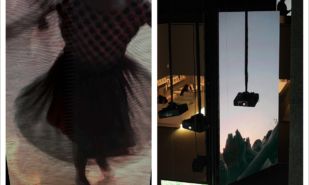On Saturday 20 May the Marylebone Theatre hosted the London premiere of Georgiy Iobadze’s play “Granny, Iliko, Illarion and I”, based on the book of the same name by the Georgian writer Nodar Dumbadze. This emotional, incredibly kind and sometimes sad story is about the life and the coming of age of a Georgian boy Zuriko, about his grandmother, his neighbours, his first love and his first losses, and leaves nobody unaffected. This is large to the credit of Georgiy Iobadze himself, who directed and performed all the roles, and who, despite his busy schedule and a very short stay in London, agreed to walk with us and answer all our questions about the actor’s life and work, as well as tell us what young actors and directors need to do.
Interview With Georgiy Iobadze
Interview With Georgiy Iobadze
Georgy, this is the first time you have staged “Me, Granny, Iliko and Illarion” in London, but your play has already been taken to many Russian cities. Does the location affect your performance and your characters?
Yes, of course, every city has its own energy. On the night before the show, as a warm-up, I like to go out into the city, repeating the lyrics and improvising in places. It might look a little crazy to the passersby because I recite my characters’ words out loud in front of people. It is an unexpected mini-performance in the street. However watching the city and the reactions of passersby, these walks inspire me and help me to come up with new intonations and expressions for the performance. I try to add something new to each performance so that it is lively and original in its own way, rather than sounding learned.
That’s very exciting! On the stage, you manage to create an incredible atmosphere of Georgian life, filled with real and lively characters. Are these characters from your childhood?
Yes, I studied at a Georgian school in Gagra for the first and second grades. Many of the images were created from memories of our character neighbours and were generally inspired by the culture of those places. My grandmother was a teacher in my school, but she never gave me any kind of favouritism. The image of Zuriko’s grandmother is largely based on my Georgian grandmother. I used to rehearse a lot in front of her, reading Shakespearean monologues and extracts from Dumbadze when I would come to Sochi every summer. When she would get tired of me she would say: “Put out the light and get out”. In the play, when Zuriko’s grandmother says this phrase, I always remember my grandmother’s intonation.
Did other members of your family also help you with rehearsals?
Of course, I often read out my monologues and excerpts from various works to my mother and sister. A funny story even came out of one such rehearsal. There was a time when I rehearsed one of Salieri’s monologues quite loudly in front of my mother every night until very late. My sister in the other room, who had to get up early every day for work, could not fall asleep on a regular basis because of the noise. I did not need to get up so early and could get a good night’s sleep after those rehearsals. One day, my sister decided to get back at me in the same way, and after one such rehearsal, she woke me up early in the morning reciting Juliet’s monologue. After that, I stopped those late rehearsals at home, but both my mother and sister are still actively involved with my work.
What has been your most memorable moment in your theatre career?
There were many of those. But one of the most memorable was the role of Korovyev in Valery Belyakovich’s production of “The Master and Margarita” at the Moscow Art Theatre. I had just graduated from college and had entered the Moscow Art Theatre, and the roles for this play had all been allocated long ago. I wasn’t really expecting anything, but I was very interested even just to see the work on the play and I asked to go to rehearsals. I thanked the director afterwards and told him that if extras were needed to keep me in mind. Two days later I got the call. It turned out that the actor playing the role of Korovyev was ill, and they wanted to try me. I went to the audition, and Valery Belyakovich liked me very much. That’s how I got my first role at the Moscow Art Theatre. It was an incredibly interesting experience, with constant creative freedom of action and feelings. Korovyev is quite a mischievous character and playing him you can improvise and fool about on stage, which only fuels interest in the character.
A tour of Japan was also an unusual and memorable experience. Valery Belyakovich staged “The Government Inspector” and “Macbeth” together with a Japanese theatre company with which he had collaborated since the 1990s. I played Gogol in “The Government Inspector” acting as the narrator and in “Macbeth” I played a witch. The productions were in Japanese, so I learned the individual Japanese phrases for my roles, but the roles mostly involved physical action. I was surprised at how responsive the Japanese audience was, everyone very polite and a bit childlike, and most importantly, they were not afraid to show their innocence.
You have already played many very unusual characters. What other characters would you like to play?
I love Shakespeare and I would be interested in playing the characters in his works, both heroes and villains: Richard III, Othello, Iago and many others. I would be interested in playing villains because the characters depend a lot on the actor’s interpretation of the part. So I am also interested in the roles of Woland and Master because these dual roles can be performed in completely different ways, thus shedding new light on their stories. I love Mayakovsky’s verse, so I might like to work with his characters as well.
You started out in student theatre. Do you think this experience helped you in your later career as an actor?
Yes, in fact, it was student theatre that kept me going until my final year at university. After senior school, I followed my sister to the Ural Polytechnic (UPI). She was always a good student, so I was always copying her work, but realised right from the start that my degree did not interest me at all. I left UPI just before my graduation, but the student theatre “The Old House” became my first theatrical home. We staged a lot of classics, Gogol, Bulgakov, even Zoshchenko. Taking part in events like that gives you the opportunity to practise on stage and gain the courage you need for a more serious work.
Given your varied experience in theatre, are you considering teaching theatre arts?
I have been offered this opportunity before, but so far I have declined. I’ve done a few masterclasses, but that is very different from fully-fledged teaching. I don’t really like giving advice to fellow actors on how to play better and what can be corrected, which is probably why teaching is not really my thing. An actor is a delicate and fragile creature, so only someone who understands psychology very well and is able to feel the other person completely can direct another’s playing. Each actor has his own vision, which he gradually learns not to lose through the desire of the other person, most often the director, otherwise it can lead to conflicts, both internal and external.
Still, what advice would you give to aspiring actors?
The main thing is to believe in yourself, to believe in your possibilities! Participate in any interesting projects, collaborate with the same budding directors and other actors, and direct something yourself. There was a period when it was very difficult. There weren’t many offers, I was acting but not directing. That’s when I started working on “Granny, Iliko, Illarion and I”. In such cases, the main thing is to take the material you love and feel close to your heart and just do it yourself. You should never waste time waiting for someone to take you for a role, but take matters into your own hands.
That’s very good advice, thank you! Finally, I would like to ask if anyone can become an actor
Shakespeare wrote: “All the world’s a stage, and all the men and women merely players”. If one is interested, it is certainly worth a try. Since I was a child I have loved performing in front of my relatives, as an extra in the opera house where my mother worked, and at festivals. The main thing is a desire to perform and the absence of shyness and beyond that, it all depends on the person.




